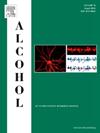Impact of parental ethanol exposure on offspring memory: Sex differences in spatial and passive avoidance tasks
IF 2.9
4区 医学
Q3 PHARMACOLOGY & PHARMACY
引用次数: 0
Abstract
The impact of parental alcohol exposure on subsequent generations recently gained significant attention. Ethanol, widely consumed by humans, is known for its anxiolytic effects upon initial use. However, repeated ethanol consumption leads to cognitive dysfunction, dependence, and other physical abnormalities. In line with recent publications from our group, this study investigated the role of parental ethanol exposure—10 days prior to gestation—on learning and memory, which are critical cognitive abilities, in male and female offspring.
Adult male and female Wistar rats (n = 12) were exposed to ethanol (in drinking water) for 30 days, followed by a 10-day ethanol-free period. Each rat was then paired to mate with either an ethanol-naïve (control, n = 12) or ethanol-exposed rat, resulting in four distinct groups: (1) control male and female, (2) ethanol-exposed male and control female (P.EE), (3) ethanol-exposed female and control male (M.EE), and (4) ethanol-exposed male and female (P + M.EE). Adult male and female offspring were tested for spatial learning and memory (Morris Water Maze) and passive avoidance memory. Additionally, brain-derived neurotrophic factor (BDNF) levels in the cerebrospinal fluid were evaluated.
Results showed that spatial memory was negatively affected by parental ethanol consumption in both male and female offspring, while spatial learning was impaired only in female offspring of ethanol-exposed dams. In the passive avoidance paradigm, memory retrieval was impaired in ethanol-exposed male offspring, whereas in females, only the P + M.EE group showed a deficit in memory retention. While BDNF levels decreased in male offspring, an enhancement in BDNF was observed in female offspring of the P. EE group.
In conclusion, our findings suggest that parental ethanol exposure before conception has differential impacts on learning and memory, depending on the offspring's sex and the type of memory tested. Spatial memory was affected in both sexes (except for females in the P. EE group), while memory retrieval in the passive avoidance task remained unaffected in female offspring of the P. EE and M. EE groups. Conversely, male offspring of ethanol-exposed sires and dams exhibited deficits in passive avoidance memory. This may suggest that in memory tasks involving inhibitory cues, such as passive avoidance, female offspring of ethanol-exposed dams or sires are more resilient to memory deficits compared to male offspring. This resilience could possibly be attributed to their higher anxiety levels relative to males.
父母酒精暴露对后代记忆的影响:空间和被动回避任务的性别差异。
父母饮酒对后代的影响最近引起了极大的关注。乙醇被人类广泛消费,在初次使用时因其抗焦虑作用而闻名。然而,反复饮用乙醇会导致认知功能障碍、依赖和其他身体异常。根据我们小组最近发表的文章,本研究调查了父母在妊娠前10天乙醇暴露对雄性和雌性后代学习和记忆的作用,这是至关重要的认知能力。将成年雄性和雌性Wistar大鼠(n=12)暴露于乙醇(饮用水)中30天,然后是10天的无乙醇期。然后将每只大鼠与ethanol-naïve(对照组,n=12)或乙醇暴露大鼠配对交配,形成四个不同的组:(1)对照雄性和雌性,(2)乙醇暴露雄性和对照雌性(P.EE),(3)乙醇暴露雌性和对照雄性(M.EE),(4)乙醇暴露雄性和雌性(P+M.EE)。对成年雄性和雌性后代进行空间学习记忆(Morris水迷宫)和被动回避记忆测试。此外,脑源性神经营养因子(BDNF)水平在脑脊液进行评估。结果表明,乙醇摄取量对雄性和雌性后代的空间记忆均有负面影响,而酒精摄取量对雌性后代的空间学习均有影响。在被动回避范式中,酒精暴露的雄性后代的记忆检索受到损害,而雌性后代只有P+M受到损害。情感表达组表现出记忆保留的缺陷。当雄性后代的BDNF水平下降时,在P.EE组的雌性后代中观察到BDNF水平的增强。总之,我们的研究结果表明,怀孕前父母酒精暴露对学习和记忆的影响是不同的,这取决于后代的性别和记忆测试的类型。空间记忆在两性中均受到影响(p.e.组的雌性除外),而在被动回避任务中的记忆提取在p.e.组和m.e.组的雌性后代中未受影响。相反,酒精暴露的雄性后代表现出被动回避记忆的缺陷。这可能表明,在涉及抑制线索的记忆任务中,如被动回避,酒精暴露的雌性后代比雄性后代更能适应记忆缺陷。这种适应力可能归因于女性相对于男性的焦虑水平更高。
本文章由计算机程序翻译,如有差异,请以英文原文为准。
求助全文
约1分钟内获得全文
求助全文
来源期刊

Alcohol
医学-毒理学
CiteScore
4.60
自引率
4.30%
发文量
74
审稿时长
15.6 weeks
期刊介绍:
Alcohol is an international, peer-reviewed journal that is devoted to publishing multi-disciplinary biomedical research on all aspects of the actions or effects of alcohol on the nervous system or on other organ systems. Emphasis is given to studies into the causes and consequences of alcohol abuse and alcoholism, and biomedical aspects of diagnosis, etiology, treatment or prevention of alcohol-related health effects.
Intended for both research scientists and practicing clinicians, the journal publishes original research on the neurobiological, neurobehavioral, and pathophysiological processes associated with alcohol drinking, alcohol abuse, alcohol-seeking behavior, tolerance, dependence, withdrawal, protracted abstinence, and relapse. In addition, the journal reports studies on the effects alcohol on brain mechanisms of neuroplasticity over the life span, biological factors associated with adolescent alcohol abuse, pharmacotherapeutic strategies in the treatment of alcoholism, biological and biochemical markers of alcohol abuse and alcoholism, pathological effects of uncontrolled drinking, biomedical and molecular factors in the effects on liver, immune system, and other organ systems, and biomedical aspects of fetal alcohol spectrum disorder including mechanisms of damage, diagnosis and early detection, treatment, and prevention. Articles are published from all levels of biomedical inquiry, including the following: molecular and cellular studies of alcohol''s actions in vitro and in vivo; animal model studies of genetic, pharmacological, behavioral, developmental or pathophysiological aspects of alcohol; human studies of genetic, behavioral, cognitive, neuroimaging, or pathological aspects of alcohol drinking; clinical studies of diagnosis (including dual diagnosis), treatment, prevention, and epidemiology. The journal will publish 9 issues per year; the accepted abbreviation for Alcohol for bibliographic citation is Alcohol.
 求助内容:
求助内容: 应助结果提醒方式:
应助结果提醒方式:


